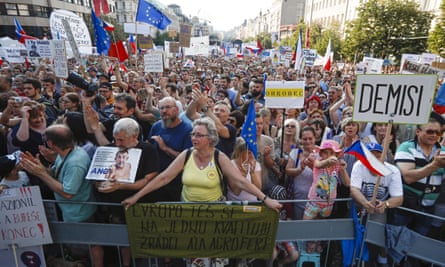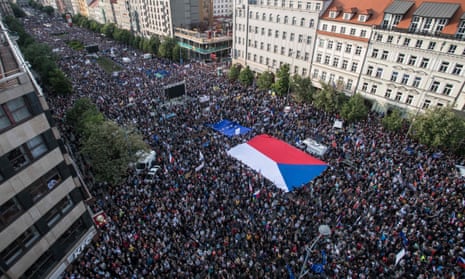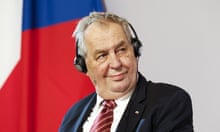The Czech Republic witnessed its biggest political protest since the fall of communism after an estimated 120,000 people gathered in Prague to demand the resignation of the prime minister, Andrej Babiš.
Waving Czech and EU flags, demonstrators filled Wenceslas Square, the scene of euphoric rallies 30 years ago that ushered in the velvet revolution and ended communist rule in the former Czechoslovakia.
Television footage showed crowds stretching the length of the square, a distance of nearly half a mile, bringing the city centre to a halt and fulfilling organisers’ hopes of an impressive show of opposition strength.
Holding banners saying “Resign”, protesters – including some who had travelled from distant locations – voiced anger over Babiš’s continuation in office despite mounting scandals over the misuse of EU funds.
The mixed social makeup suggested anger had reached beyond liberal, relatively cosmopolitan areas around Prague, where opposition to the prime minister has always been strong.
“He’s like a mafia boss and he’s the worst politician in the Czech Republic – he reminds us of communism,” said Dagmar Kmochova, a shop owner from Kutna Hora, a town 50 miles east of Prague.
Feelings at Tuesday’s rally – the latest in a series of anti-Babiš events – were running high after the leaked disclosure of a preliminary European commission auditors’ report accusing the Czech leader of conflicts of interest over his ties to an industrial conglomerate, Agrofert, that receives large EU subsidies.
Hours before the demonstration, Babiš, the Czech Republic’s second-richest man, launched a blistering counterattack, using a parliamentary debate to describe the report as an “attack on the Czech Republic” aimed at destabilising the country.
That explanation cut little ice at Tuesday’s demonstration, which followed four earlier rallies in the Czech capital in the past six weeks.

“Babiš is an oligarch. He is like [Silvio] Berlusconi but worse,” said Vaclav Bozdech, a retired clerk, who was wearing a mask of the prime minister’s face with the letters StB stamped on the forehead in reference to the prime minister’s alleged role as a secret agent for the communist-era secret police.
“He thinks he owns the Czech Republic and he isn’t even Czech. He is a Slovak gangster and they were glad to get rid of him. He is like the hijacker of a plane and we are his hostages.”
A rally in Wenceslas Square two weeks ago attracted at least 50,000 people. Mikuláš Minář, a spokesman for A Million Moments for Democracy, the group organising the protests, told Tuesday’s gathering it had doubled the previous attendance.
He pledged to ratchet the pressure up further by announcing plans for an even bigger rally on 23 June in Prague’s Letná Park – the venue of a rally in 1989 credited with presaging the final end of the communist regime – saying Wenceslas Square was no longer large enough to accommodate the growing protests.
Babiš, 64, who became prime minister in 2017, has repeatedly said he will never resign.

After police recommended in April that he face fraud charges over alleged misuse of EU funds, he responded by sacking the justice minister in his coalition government and installing a close ally, Marie Benešová.
Babiš’s opponents say the EC audit appears to uphold a complaint by Transparency International that the prime minister is breaking conflict of interest rules by retaining effective control of Agrofert despite supposedly putting it into a trust.
“Mr Babiš is the beneficial owner of the Agrofert group companies and, since February 2017, of the two trust funds, which he fully controls, and therefore has a direct economic interest in the success of the Agrofert group,” the commission report said.
It said his government functions were “compromised” by his involvement in budget decisions affecting Agrofert, and the Czech Republic could be forced to repay millions of euros in subsidies.
David Ondráčka, the director of Transparency International in the Czech Republic, predicted Tuesday’s protest would be a “nail in Babiš’s political coffin”.
He said: “He cannot survive this public pressure and these EU reports. He knows that the EU budget and the Czech budget will no longer serve as an ATM where he can pick up whatever he needs. He will never surrender easily but with mounting public anger, smart opposition moves and proper institutional pressure I believe he will no longer be prime minister.”
Babiš, who has dismissed the accusations as an “organised plot”, called the commission audit “very dubious” and pledged the Czech Republic would not repay any subsidies. “European bureaucrats despise Czech laws. Brussels is interfering in our laws,” he said.









